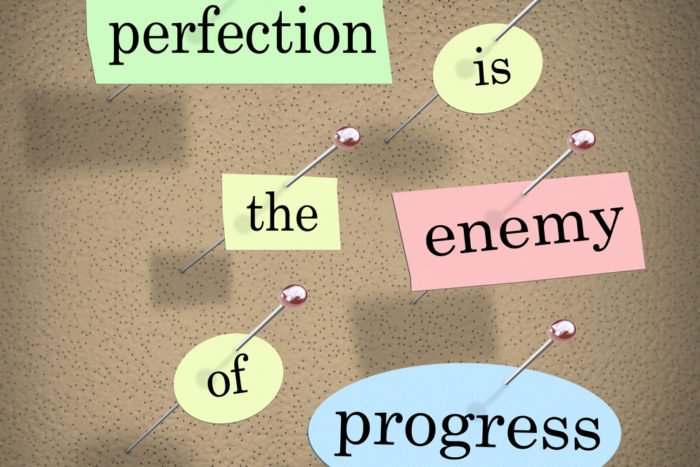How Becky Cope as a Perfectionist
“Don’t worry I will fix everything myself. You can all leave.”
She said, feasting her face on the laptop. Becky is the CEO of “DEWTECH World” she is dominantly melancholy. Most times she would work almost 24 hours just to make sure she did a perfect job. You can say she is a workaholic. Becky often wishes eating was optional so she could skip meals just to work. Her company designs games and applications for clients. And the company has been credited for that.
One of their biggest investors needed the company to design a game that would sell in the market. On this account, Becky set a meeting with her creative experts but she was not satisfied with what they came up with. Hence, she angrily decided to single-handedly carry out the project; seeking nobody’s view. She didn’t think of giving them a second chance or collectively creating something.
After a week, she reached Mr. Steve, informing him the game was ready. When he came, he was amazed at the overview she gave him but to his disappointment, the game didn’t run properly because there were errors in the coding. This was because Becky was too exhausted to try running and checking the program, for errors. And for that reason, DEWTECH World lost its biggest investor.

Mechanism for Coping with Perfectionism
At times, we often wish we could operate efficiently in different aspects of life; giving solutions to every problem just like Becky in the above story. Sometimes this might pop up, out of selfish desires for fame while other times, out of the desire to see things being done perfectly without errors. The latter is often birth by perfectionism, one of the attributes of melancholy.
The above fact has left a significant number of people finding it hard, the solution they can best proffer and also believing they should function effectively in every sphere, which if they don’t, their self-esteem suffers great weight-loss; negativism. This can be applied in different fields of life be it profession, activities at leisure, family decision making, and what have you.

One important fact we should come to the knowledge of is, “Every Human equals A Single Solution” regardless of the number of talents, skills and professions he has. These talents, skills and professions are media through which he can proffer this solution. It’s just like serving carbohydrates in different forms (rice, yam, flour etc). When you are meant to serve carbohydrates, serve it the best way you can and leave the vitamin to be served by the right person assigned for the job. If only Becky had given her creative experts a second chance and sorted others’ views like the programmers, they would have had an error-free project.
Also read: What is the difference between purpose and destiny? Learn here.
God created everyone to solve a single problem which is why we have billions of humans, each unique to the solution he was created to bring about. If peradventure one single person could solve the world’s problems, then everyone would just exist, die and go to heaven since he has nothing to give an account of.

Ever wondered what makes a house comfortable to live in? No single structure in the house alone can provide comfort unless every structure is in its rightful position and condition. So also, one person can’t completely make the world a better place except others are rightly positioned to do the needful. Becky thought she could design a perfect game but she failed at it and it cost the company. Sadly, she learnt the hard way.
Further, the fact that everyone equals a solution doesn’t mean being versatile is not an option. Being versatile is a great advantage. If you resolve to know the solution you can best give as a person, it will help you find your true self and give you a single pointed arrow rather than pointed arrows in life.
Ever wondered why there are life experts in different fields? Simply because everyone has a field he is best at.
The words of Mother Teresa read, “I alone cannot change the world, but I can cast a stone across the water to create many ripples” This just means everyone has his/her part to play. Hence, instead of trying to solve every problem, find your niche, and fix the problem in it while engaging others where necessary.
Also read: Learn how to avoid missing opportunities

Frequently Asked Questions on Perfectionism
How do you overcome being a perfectionist?
Overcoming perfectionism is a journey, not a destination. Here are the key steps:
- Self-Awareness: Recognize your perfectionist patterns. When do these thoughts arise? What situations trigger them?
- Challenge Negative Thoughts: Perfectionist thinking often involves “all-or-nothing” statements. Challenge these with more realistic self-talk. Instead of “This project is a failure,” try “There are areas for improvement, but overall it’s good.”
- Set SMART Goals: Specific, Measurable, Achievable, Relevant, and Time-bound goals will give you a roadmap for success, boosting confidence and reducing the fear of inadequacy.
- Embrace Mistakes: Mistakes are stepping stones, not roadblocks. Reframe them as learning opportunities and celebrate your resilience in overcoming them.
Is perfectionism a coping mechanism?
Yes, perfectionism can be a coping mechanism developed in childhood. It might stem from a need for approval or control over unpredictable situations. Recognizing this root cause can help you address the underlying anxieties.
How to handle failure as a perfectionist?
- Failure is inevitable, but perfectionists often view it as catastrophic. Here’s how to handle it:
- Analyze the situation: What went wrong? Was it truly a failure or a learning experience?
- Practice self-compassion: Treat yourself with kindness. Forgive yourself for your mistakes and move forward.
- Focus on progress: Celebrate small wins and acknowledge your efforts, not just the outcome.
How do I stop overthinking and being a perfectionist?
Overthinking fuels perfectionism. Here are some tips:
- Set time limits: Allocate specific time slots for tasks and stick to them. This prevents endless revisions.
- Practice mindfulness: Meditation and other mindfulness techniques can help you stay present and focused on the task at hand, reducing overthinking.
- Take action: Don’t get stuck in analysis paralysis. Often, just starting something is better than waiting for it to be perfect.
What is the root cause of perfectionism?
There can be multiple root causes of perfectionism, including:
- Upbringing: Critical or demanding parents can contribute to perfectionist tendencies.
- Personality: Some personality types are naturally more prone to perfectionism.
- Fear of failure: The fear of not being good enough can fuel the need for perfection.
Thanks for reading! Feel free to share and leave a comment.



This has really challenged me. I believe this post spoke to me!
Really glad to know the article has challenged you.